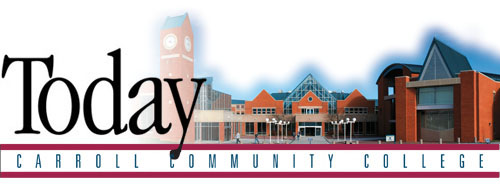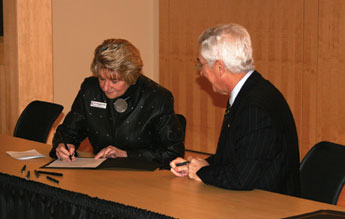
| Spring 2006, No. 24 |
|
Contents College, University Next Building Included in State Capital Budget “Picture This” Project Elicits Student Perceptions of Carroll Pictures from “Picture This” Project
|
| College, University of Baltimore Sign Transfer Agreement in Computer Simulation and Digital Entertainment |
|
On Friday, March 3 representatives from Carroll and the University of Baltimore (UB) signed an articulation agreement to facilitate student transfer into UB’s new program in Simulation and Digital Entertainment (SDE). The undergraduate program at UB enables students to learn the sophisticated development techniques behind videogames and IT-based simulation and training. This increasingly popular field of study is supported by a growing sector of the Maryland economy. Maryland has the nation’s second largest number of videogame and simulation companies, many of which are located in Baltimore and Montgomery counties. An articulation agreement is a written contract between a community college and a four-year institution spelling out the courses that are accepted at a receiving institution. This ensures the necessary coursework is completed so the student can automatically enter the institution as a junior. Carroll’s Associate in Applied Science (A.A.S.) degree in Computer Graphics, Multimedia Design will transfer to UB’s SDE program, making students well-prepared for upper level coursework in their discipline. “The University of Baltimore has been very dedicated to developing cutting-edge programs that prepare students for emerging professional opportunities. We at Carroll are delighted that we can partner with such an excellent program,” said Carroll Community College President Dr. Faye Pappalardo. Vice President of Academic and Student Affairs at Carroll Dr. James Ball said, “This program articulation creates a wonderful opportunity for us as we develop a focus on programs dedicated to entertainment technologies. Our A.A.S. students will have the opportunity to transfer and extend their educational and professional development at UB, which has been an exceptional institution in the recruitment of community college graduates.” Three other Maryland community colleges also participated in the articulation agreement with UB. They are Anne Arundel Community College, Montgomery College, and the Community College of Baltimore County. UB President Robert L. Bogomolny said that the SDE articulation agreement is a demonstration that public higher education is committed to meeting the state’s workforce needs by bringing prepared graduates to the job market as quickly as possible. “We’re working together with our partner institutions to affirm their interest, while at the same time making it simple and affordable for them to get the education they need to compete in the marketplace,” said Bogomolny.
Carroll president Dr. Faye Pappalardo signs articulation agreement in Simulation and Digital Entertainment with University of Baltimore president Robert Bogomolny looking on. “Game programming and simulation design is an exciting realm of computing,” said Chair of Technical Studies at Carroll Dr. Edward Crook. “While computer games have a long history, they have traditionally been limited to expensive computers or minimal designs. Recent improvements in computer technology--specifically speed, multimedia, and communications--have changed this. The computer game, simulation, and entertainment industries are driving computer development.” Program Director of Computer Graphics at Carroll Scott Gore describes the A.A.S. program this way: “We prepare students for positions in the interactive design, multimedia design, and digital video industries. The curriculum stresses the development of digital design skills for CD ROM, Interactive DVD, digital video editing, motion graphics, web production, digital imaging, and print design. “Since employers today put emphasis on communication literacy, students also take courses to develop skills in writing, public speaking, psychology, professional development, history, and marketing to round out their education,” said Gore. |
